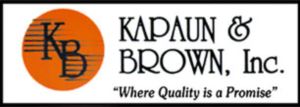Completing the search for your first home is thrilling. You’re probably trying to keep track of numerous details to ensure you’re making the right choice. We believe that gaining insight into your future HVAC system is crucial. The property’s HVAC system represents a significant investment and source of potential long-term costs, which is why due diligence is important for first-time homebuyers.
In the following guide, we’ll outline seven tips for discovering all there is to know about a home’s heating and cooling system. And if you want a deeper opinion from the experts, consider calling Kapaun & Brown. Our experienced team can share details about your options with industry insights you won’t find elsewhere.
1. Which Kind of HVAC System Does the Home Use?
Start by identifying what kind of HVAC system the home features. Furnaces generally last longer than air conditioners, and relatively new types of HVAC equipment like heat pumps boast average life spans that are even longer. Getting the details on the make and specific model ensures you have a clear idea of how much it might cost in upkeep over time.
2. How Long Ago Was the System Installed?
It also helps to learn how old the HVAC system is when you’re looking at a potential new home. For the most part, HVAC systems last about 10-12 years. Knowing when it was installed helps you plan for possible repair needs or when it might break down. Older systems may be more vulnerable to problems, so budgeting for a replacement unit might be needed faster than expected.
3. What Does the Warranty Cover?
Don’t forget to look into whether the HVAC system is still under warranty. If it is, this can lighten the load for maintenance costs. HVAC warranties often cover parts and labor, but specifics will vary. Review any terms you don’t recognize to make sure you fully understand your coverage and the likelihood of out-of-pocket costs.
4. When Was the Last Time It Received Maintenance?
Don’t forget to check the maintenance history of the HVAC system, if the records are accessible. This service history can reveal if the system constantly broke down or how often maintenance is performed. Inquire about key tasks such as changing the air filter, which is a positive sign indicating regularly scheduled tune-ups.
5. Do You Know Its Energy Efficiency Ratings?
Purchasing a home with a heating and cooling system with high energy efficiency isn’t just smart; it leads to smaller utility bills and less of an impact on the environment. Check out the seasonal energy efficiency ratio (SEER) ratings for air conditioning along with the annual fuel utilization efficiency (AFUE) for furnaces. The higher the SEER rating, the more efficient the cooling over the whole season, while strong AFUE ratings indicate that the fuel is efficiently converted into useable heat.
6. Have You Noticed Signs of Problems After Your Own Inspection?
Even without heating and cooling expertise, it’s still a good idea to examine the HVAC system on your own. Keep an eye out for any concerning items that haven’t been mentioned by the seller. This includes strange noises, stubborn patches of the house that are too hot or cold and attempts to cover up any serious damage.
7. Is an Experienced HVAC Technician Available to Help?
If you’re not quite sure about the condition of the HVAC system, it’s beneficial to get input from certified HVAC professionals. They can spot things you might miss, including leaking coolant, damage to the wiring or damaged ductwork.
A Chat with Kapaun & Brown Simplifies Your Home-Buying Journey
Selecting your first home is meant to be a joyful event, and Kapaun & Brown can ensure yours is too. Reach out with us at 641-321-6747. We can go over the details about how our HVAC services help make this process smoother, giving you what you need to make an offer with confidence.
